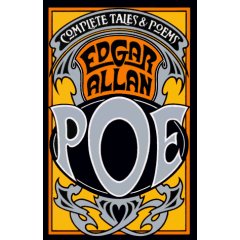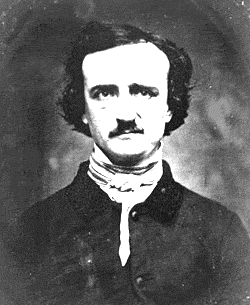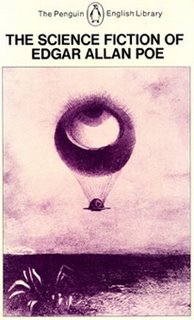
Devoted audiobook listener that I am, I had to admit, I was a little bit stymied when it came to Edgar Allan Poe. Sure, there’s any number of titles out there, but the majority of them at many libraries are in the ever dwindling cassette form (and more often than not these days the cassettes are in atrocious condition) and what is out there in any format is apt to be repetitive.
Repetitive actually seems like too soft a word. I ordered every item the libraries had available and still ended up with something like six readings of “The Black Cat” or “The Tell-Tale Heart.” (Maybe next October I’ll do something similar and I’ll very specifically critique each particular rendition of one story, say William Roberts “Tell-Tale Heart” versus renderings provided by Jack Foreman, David Case, Paul Scofield, and all the others who essay this little charmer.)
At any event, armed with a multitude of recordings and a durable new copy of The Complete Tales and Poems of Edgar Allan Poe (more about that later), I set out to read or listen to every single piece of fiction and poetry the man wrote. His criticism and essays I left well enough alone unless they turned up on a CD or in the book or they were particularly well regarded (Poe himself considered his prophetic cosmogony “Eureka” to be his crowning achievement; in a just world it’d receive some credit). The reason for this leaving-out was because there aren’t any particularly good volumes of it and what is out there is voluminous in the extreme and all too frequently consists of reviews of books of which barely any survive save in rare book stalls. Poe is rarely that good a nonfiction stylist to warrant the effort.
Nevertheless, I’ve come to find it a bit irritating and galling that Poe is so pigeonholed by readers and blacklisted by American critics as juvenile twaddle and booga booga spookshow. To run down a list of what frequently makes the anthologies is to see the same six or seven faces showing up and the words “macabre,” “horror,” “chilling,” “terror,” etc. popping up in the titles. One two-cassette product reviewed herein actually is entitled “Tales to Make You Check Under the Bed” and features no less than three stories that wouldn’t be classified as horror by even the broadest most lenient definitions imaginable times ten. Even your scaredy cat grandma’s maiden aunt Hildegard wouldn’t get a chill — or check under her bed for that matter.
Our first audio title up for consideration, then is put out by NAXOS Audiobooks.

The Fall of the House of Usher, The Pit and the Pendulum, and Other Tales of Mystery and Imagination, by Edgar Allan Poe, Read by William Roberts, NAXOS AudioBooks Ltd., 2003
NAXOS AudioBooks, a subset of classical music music label Naxos, mixes up a few lamentable musical dirges betwixt a what’s what list of the Poe oeuvre. And so we are treated to the lamentable strains of the soundtrack to King Kong (seriously) among others. This is a bit of a gimmick with Naxos and you can’t entirely blame them. With so much back catalog orchestral music, it’s good to just use it now and then, though the production leans toward a tendency for shrieking strings, a kind of Bernard Hermmann conductor style.
“The Pit and the Pendulum" is a model of economy of plot, suspense, and action, and it really nails Poe’s talent for conveying a claustrophobic sense of restriction. It also demonstrates a rather common styling of Poe’s I hadn’t really noticed before. The vast majority of his stories are first person narratives and the narrator is almost entirely alone. If not alone in the sense of being completely isolated and without friend, alone in the sense that other characters rarely have lines of dialogue. In this story, for instance, there is only the narrator, who makes impersonal reference to other characters, even including General LaSalle who saves him at the story’s climax.
“The Tell-Tale Heart” has a similar compactness and narrative isolation that is mirrored almost perfectly in “The Black Cat.” Both stories, as you can guess, frequently end up in compilations, though with good reason. They are rapid descents into hells of the narrators’ making and both feature the classic “reveal” at the end. “Tell-Tale” is similar in many ways to “The Imp of the Perverse” published two years later in that both stories feature a crime the narrator has gotten away with only to be undone by his own inability not to confess. One could see the titular black cat too, if one chose, as a kind of walled-up howl of the soul, the narrator’s better nature — before his fall from grace — crying out his guilt.
“Ligeia” is probably the least well-known of the tales included on this CD set. The story’s melancholic aspect made me understand early on in this project what can often be distressing about reading great quantities of Poe. Long on atmosphere and short on scene, the melancholy tales of the “macabre” start to run a bit together.
While the stories are eventful (as given to us through the narrator’s psyche rather than flat out depicted), conversations are generally recorded in strict narrative throughout with very little actual dialogue. This gives the stories a kind of sensibility, but a little of this atmosphere goes a long way and we listen or read Poe wanting at times a little more interaction. A great sameness sometimes overwhelms the reading of the author so that the stories can mush themselves into a great whole rather than too many specifics. This is the flaw in so many anthologies in choosing only this one side of Poe’s personality.
Atmosphere of this kind is almost all that is going for “The Masque of the Red Death.” Nearly impossible to read as merely a story, the allegorical quality of this tale is nowhere so evident as the Prince’s various rooms adorned in one color after the other. This use of allegory is strangely unique to this story, as Poe himself, in his compositional theories and criticism, was generally down on allegorical writing. There is much in this story that puts one to mind of Shakespeare’s The Tempest, with both stories’ character of Prospero retreating from the outside world only to find that all their art can’t keep out reality. Poe, of course, can’t help himself and spends much of this allegorical tale describing the contours of the room and its decorations, rather like peopling his “Philosophy of Furniture” essay with suffering and death.
If there was a story that was most responsible for the entire career of H.P. Lovecraft (as well as a million imitators), this might be the one: isolated narrator, sounds in the walls, storms and so forth. “The Fall of the House of Usher,” while still in Poe’s trademark essay style of action, seems to hold one’s mind long after reading it, and there it seems to be populated with more action than the text will support. There is a haunting quality to the best of Poe’s horror stories that they linger and they seem to imprint themselves on your memory with a vividness and actionable specificity lacking in print.
Reader William Roberts provides a lovely narration, very dramatic, and isn’t bothered with much characterization as there aren’t that many characters anyway. His few acting bits, such as “The Cask of Amontillado” and “The Facts in the Case of M. Valdemar” are wonderful, especially in the latter where the whispery croak of the titular dead man is especially creepy and gave me shivers in earnest.
 The Masterworks of Edgar Allan Poe, By E.A. Poe, Read by Paul Scofield, Dove Books on Tape, Inc., 1987
The Masterworks of Edgar Allan Poe, By E.A. Poe, Read by Paul Scofield, Dove Books on Tape, Inc., 1987Having first heard Scofield’s literary readings when he provided a considerably less than satisfactory performance of Eliot’s “The Wasteland,” I wasn’t entirely certain how pleasurable these essays into fiction and poetry were going to be. A phenomenal actor, Scofield seems to imagine his poetry reading should be overly determined by line breaks, the clumsy amateur reader’s mistake. There was something about his voice, though, in reading that lends itself toward monotonous vagaries, a weakness in any reading, but in Poe’s stories, which lean toward lengthy exposition followed by momentary drama, could have proved a crippling defect.
Here, however, at times, much as his pained delivery in the Zeffirrelli Hamlet as the Ghost of the King, Scofield’s voice — rich, deep, sombre, and gently rough edged — can carry a great terror. His rendition of “A Descent into the Maelstrom” holds a real terror and delivers it with sheer brilliance. No one can read this story and not almost immediately think of Jules Verne’s riff on quite the same ideas, demonstrating precisely how influential Poe’s writing was.
There were, however, few stories on this that didn't turn up elsewhere.
 The Science Fiction of Edgar Allan Poe, by E.A. Poe, Read by Paul Scofield, Dove Audio, Inc., 1986.
The Science Fiction of Edgar Allan Poe, by E.A. Poe, Read by Paul Scofield, Dove Audio, Inc., 1986.This batch is curious in that it contains as science fiction “Some Words with a Mummy” which might best be described as a kind of satire on scientists and their pomposity, as well as the then craze for things Egyptian, than any other genre. This is clearly noticeable by the names of the characters given, such as the dandy Mr. Silk Buckingham, Captain Arthur Sabretash, and the mummy, Allamistakeo. The mummy’s reviling of his own culture at the time of his entombment, his references to others of the story’s time wishing to do the same, and other little asides and commentary made this the liveliest of Poe’s stories listened to at this stage. It would have made a nice mix in with the earlier CDs to spice things up and provide a bit of contrast with its dialogue and its variable characters.
Another strangely placed “science fiction” piece is the humorous variant on The Arabian Nights, “The Thousand and Second Tale of Scheherazade,” which includes references to the girl having read the anachronistic Machiavelli and noting that to be bowstrung was “a thing very little more pleasant than hanging, only a trifle more genteel!” It too is a kind of humor tale, long lists of impossible things like a man whose arm is so long he can sit in Damascus and write a letter in Baghdad. The upshot of the tale is that by telling just one more story, just one more, this more fantastical than any of the others, Scheherazade dooms herself.
“MS Found in a Bottle” is one of Poe’s better known stories, indeed it is the tale that got his career started. It reads as though itself a prologue to “A Descent into a Maelstrom” although the geography is altered somewhat. The two pieces also fit together with The Narrative of Arthur Gordon Pym and would make a handsome volume all three together. A nautical tale, as indicated by its title, “MS” is another hollow earth type story, like the novel in featuring a smaller ship run down by a larger one, though this larger is a ghost ship. There is again, indeed, oddly, that kind of weird non-event feeling sometimes to Poe’s narrative depiction of events that remains with you much after the reading, forcing specific visions on you at a later time. It’s one of his underrated magic tricks.
“A Tale of the Ragged Mountains” is another one of the stories showcasing Poe’s interest in mesmerization, the early version of hypnosis, from its early days when it was so little known and considered so radical and mysterious. This too is another story that reads more as an almost essay. That the description happens while a man is out walking is no particular offset to this highly descriptive series of passages with very little action involved. This is the kind of text Poe all too often subjects his readers to:
Bazaars abounded; and in these were displayed rich wares in infinite variety and profusion -- silks, muslins, the most dazzling cutlery, the most magnificent jewels and gems. Besides these things, were seen, on all sides, banners and palanquins, litters with stately dames close veiled, elephants gorgeously caparisoned, idols grotesquely hewn, drums, banners, and gongs, spears, silver and gilded maces. And amid the crowd, and the clamor, and the general intricacy and confusion- amid the million of black and yellow men, turbaned and robed, and of flowing beard, there roamed a countless multitude of holy filleted bulls, while vast legions of the filthy but sacred ape clambered, chattering and shrieking, about the cornices of the mosques, or clung to the minarets and oriels. From the swarming streets to the banks of the river, there descended innumerable flights of steps leading to bathing places, while the river itself seemed to force a passage with difficulty through the vast fleets of deeply -- burthened ships that far and wide encountered its surface. Beyond the limits of the city arose, in frequent majestic groups, the palm and the cocoa, with other gigantic and weird trees of vast age, and here and there might be seen a field of rice, the thatched hut of a peasant, a tank, a stray temple, a gypsy camp, or a solitary graceful maiden taking her way, with a pitcher upon her head, to the banks of the magnificent river.
There’s so much there and so much of it descriptive to the point of losing the reader in all these sumptuary moments that we almost forget the fact that this is a dream a man is recalling, and when he finally learns that his dream is in fact a kind of reincarnation memory, that very depth of text seems suspiciously overwrought. One reaches the conclusion after reading only a little bit of Poe that sometimes less would be more, yet when his prose sings, it is really quite a treat.
This goes hand in hand with “M. Valdemar” and “Mesmeric Revelation” and we see in these matters that a number of Poe’s stories can be grouped, not so much by genre or type but by the subject matter at hand. If you wished a collection of stories that focused on this consideration of Poe’s: “The death, then, of a beautiful woman is, unquestionably, the most poetical topic in the world” you need only put together “Berenice,” “Morella,” “Ligeia,” “The Assignation,” “The Mystery of Marie Roget,” “Eleonora” along with several of the poems and you’d have a volume after his own heart.
For the most part, though, one hears so little of Poe who did not write along such melancholy themes. Some of his more amusing pieces will form the second half of this overview/review, which I intend to post tomorrow. Join me, why don’t you?
No comments:
Post a Comment